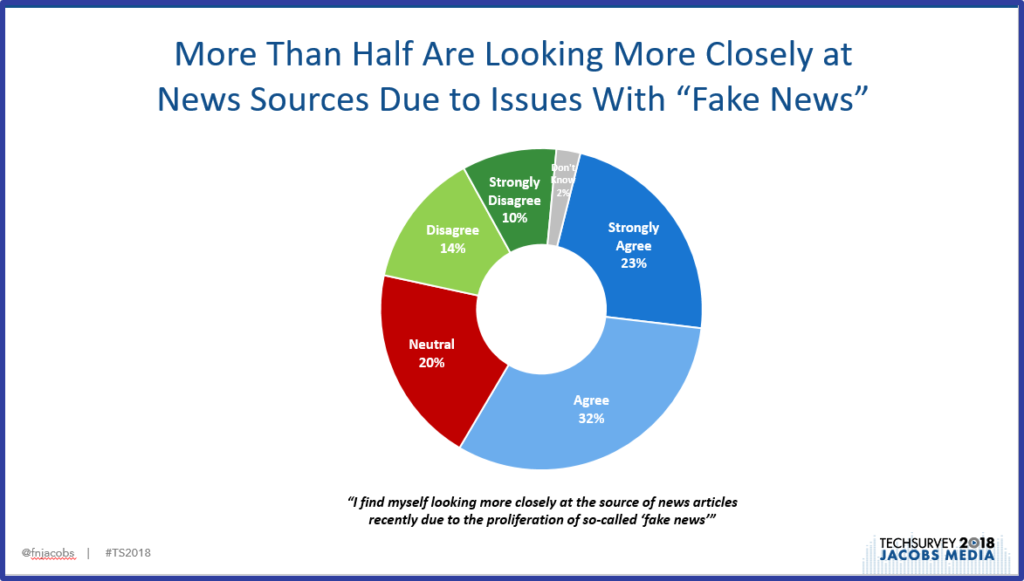 Whether you’re in middle school or are a media brand, these days there’s nothing as toxic as a bad reputation. These days, just the utterance of the term, “fake news,” unleashes a torrent of emotion, whether you’re a journalist, a politician, or just a member of the masses.
Whether you’re in middle school or are a media brand, these days there’s nothing as toxic as a bad reputation. These days, just the utterance of the term, “fake news,” unleashes a torrent of emotion, whether you’re a journalist, a politician, or just a member of the masses.
A recent story in Fast Company by Gloria Origgi suggests we’ve left the “Information Age,” and now reside in a world where it’s all about reputation…and of course, that means trust.
Origgi makes the point that while most of us don’t have the time or bandwidth to track a story or a rumor down, we have come more and more to rely on sources that have earned our trust.
And many think that’s a trend – that in the not-so-distant future, it will become less about how we critically assess a story, but how much we trust in the information source that delivers that content. Origgi quotes Frederick Hayek who postulated that “civilization rests on the fact that we all benefit from knowledge which we do not possess.”
So, who do people believe? And where do radio stations, personalities, hosts, and media brands stand on the “Trust-o-meter?” Do consumers trust in the radio stations they listen to, whether it’s delivering the news or giving away tickets to that Arctic Monkeys concert?
At Jacobs Media, we conduct a considerable amount of research – both qualitative and quantitative – in the public radio space. These stations are enjoying some of the strongest ratings in the history of their platform, and audience trust is a key driver of their success.
Our most recent Public Radio Techsurvey (our 10th annual is in the field right now), seeks to better understand the medium’s “core values.” And trust is an attribute we track.

This is how public radio listeners responded to the agree/disagree statement: “I trust public radio.”
More than six in ten strongly agree with this key evaluator of a media brand. And overall, nearly nine in ten agree or agree strongly with this notion that in public radio, you trust.
But note the demographic groups displayed on the right-hand side of the chart. Millennials turn out to be the most likely subgroup to be simpatico with this idea of public radio and trust. As we know, younger people are often especially likely to express skepticism about media and institutions. As the saying goes, their “B.S. detectors” are always on. So while public radio is certainly not drowning in Millennial listeners, those who are on board are especially apt to feel they have a trust bridge with public radio.
You cannot put a price on this. In this year’s mega-Techsurvey 2018, we asked about “fake news.” And we learned that a majority of respondents are scrutinizing news sources because of the proliferation of news with a bad smell. And many say that as a result of bogus information and content, they’re spending less time on social media.
Now, both “fake news” and “trust” are in the eye and soul of the beholder. And this post is not a commentary on the sorry state of our political discourse.
But trust and reputation go hand in hand. And when brands are not transparent, honest, and truthful, it has an even great likelihood these days of coming back to bite them.

Trust, credibility, and reputation aren’t just issues for news and talk stations. Their influence runs the gamut, and impacts every department in a radio station.
Do concert promoters trust your PD to do what she said she will do to support a show?
Do clients have confidence their ads ran when they were supposed to?
Does the air staff trust that management will negotiate fairly with them?
Can advertisers depend on the cred of sales reps to provide accurate and honest ratings materials?
At a time when Americans appear to be hyper-jaded, highly skeptical, and especially wary of institutions, brands, and cultural icons, trust and reputation can be that special advantage that separates great brands from the rest of the pack.
So, who do you trust?
And does your audience trust you?
- The Secret To Making A Great Podcast (And Great Radio) - April 16, 2025
- I Read The (Local) News Today, Oh Boy! - April 15, 2025
- Radio, Now What? - April 14, 2025




Good Article.
Thank you for reading it.